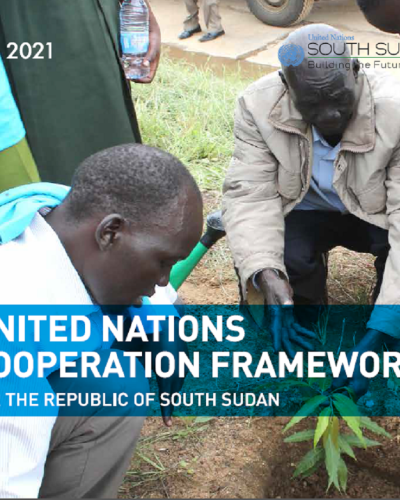United Nations Cooperation Framework for the Republic of SouthSudan

The United Nations Country Team (UNCT) remains firmly committed to supporting South Sudan and its people in achieving sustainable peace, ushering in a period of recovery and setting the stage for future sustainable development.
This UN Cooperation Framework replaces the 2016-2018 Interim Cooperation Framework (ICF) that was a bridging programme due to absence of a national development strategy, and was extended until 31 December 2018. The UNCF takes into account lessons learned from ICF implementation, including by expanding and scaling up the ICF’s strategic approach to building resilience, capacities and institutions to achieve key outcomes across four priority areas, and to gradually scale up this support.
The aim of the UNCT will be to empower national partners and communities, in particular women, youth and other vulnerable groups, to be more resilient and better placed to withstand the many challenging and complex impacts of the ongoing protracted crises. The UNCT will also provide support for strengthening capacities and institutions at the community, state, and national levels with particular focus on vulnerable areas with a potential for strong partnerships. The UNCF will be implemented through individual agencies articulating agency specific programme documents, and jointly through joint programmes.
The priority thematic areas identified are the following:
I. Building peace and strengthening governance;
II. Improving food security and recovering local economies;
III. Strengthening social services;
IV. Empowering women and youth.
Progress towards these goals will depend on the peace process, including the outcomes of the High Level Revitalisation Forum (HLRF) that takes place within the overall 2015 Agreement on the Resolution of the Conflict in the Republic of South Sudan (ARCSS). The UNCT will enhance and scale up support for the implementation of the peace agreement as opportunities emerge. Together, the above priorities will require an engendered, risk informed, flexible and cross-cutting approaches to adapt to shifting conditions on the ground and will be premised on a series of guiding principles.
These include managing expectations, conflict sensitivity that takes account of gender norms, and ‘leaving no one behind’- the universal obligation under Agenda 2030 to afford sustainable development to all, irrespective of their political affiliation, ethnic identity
or other social status.
















